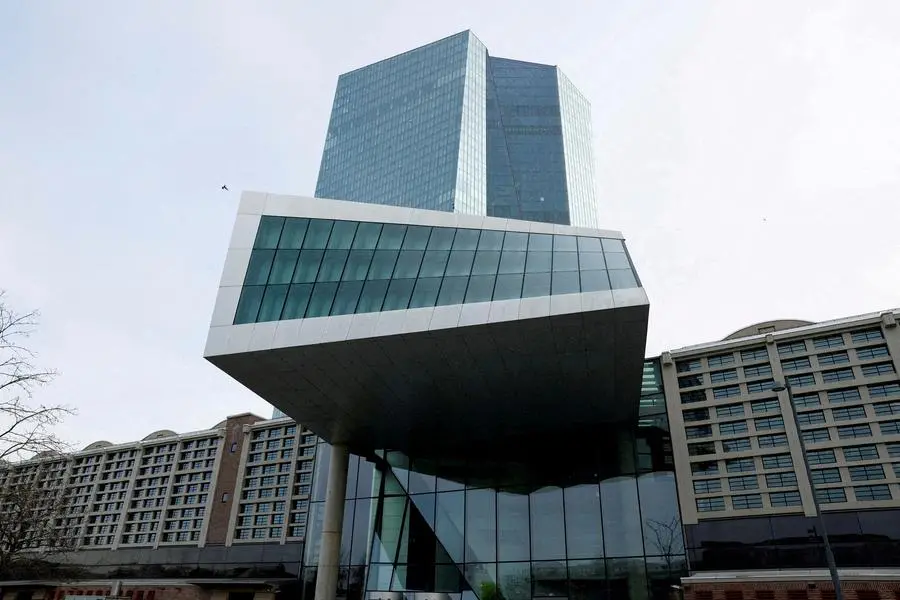PHOTO
LONDON/SINGAPORE - The euro fell sharply against the dollar on Monday, as business activity readings painted a grim picture of the euro zone economy and fuelled bets of more policy easing by the European Central Bank (ECB) this year.
The common currency dropped 0.6% to $1.1096 - on track for its biggest daily fall in more than three months and moving further away from late August's 13-month high that was driven by bets of faster U.S. monetary policy easing.
A survey compiled by S&P Global showed euro zone business activity contracted sharply and unexpectedly this month as the bloc's dominant services industry flat-lined, while a downturn in manufacturing accelerated.
The slump appeared broad-based, with Germany's decline deepening, while France returned to contraction following August's boost from the Olympic Games.
"The data certainly keeps the door open to a rate cut in October - whether they step through that door, it's too early to say but it's a pretty grim reading," said Kenneth Broux, head of corporate research, FX and rates at Societe Generale.
"The Fed shifted from inflation to growth and the ECB, at some point, will make that transition as well."
Traders now anticipate cuts of around 42 bps this year from the ECB, compared with around 38 bps last week, implying that they expect a stronger chance of the central bank cutting rates again in October.
The U.S. dollar index, which measures the greenback against six major currencies, rose 0.4% to 101.13 - continuing to stay above the one-year low it hit last week.
UK PMIS NOT SO BAD
The pound slipped 0.3% to $1.3281 but came off its session low after a similar survey showed British businesses reported a slowdown in growth this month, though it was less severe than the euro zone numbers.
Sterling touched its highest in over two years against the dollar on Friday after the release of strong British retail sales data. The Bank of England kept rates unchanged last Thursday, with its governor saying the central bank had to be "careful not to cut too fast or by too much".
The dollar slipped against the yen, albeit in thin trading due to a holiday in Japan. The greenback touched a two-week high at 144.50 yen last week after the Bank of Japan (BOJ) left interest rates unchanged and indicated it was in no hurry to hike them again.
That decision, coming just days after the Fed's 50-basis-point (bps) rate cut, induced a pause in the yen's sharp gains this month. The currency is up about 1.5% in September.
For the yen, a ruling party vote later this week to choose a new prime minister makes the BOJ's job challenging in the coming months. A snap election is regarded as likely in late October.
Liberal Democratic Party frontrunners to replace outgoing Prime Minister Fumio Kishida have presented diverse views on monetary policy.
Sanae Takaichi - aiming to become the nation's first female premier - is a reflationist who has accused the BOJ of raising rates too soon. Shigeru Ishiba has said the central bank is "on the right policy track", while Shinjiro Koizumi, son of charismatic former premier Junichiro Koizumi, has so far only said he will respect the BOJ's independence.
Bitcoin edged up 0.4% to $63,500. It had risen 2.4% to a one-month high of 64,730 earlier in the session.
Chris Weston, head of research at Pepperstone, said the "goldilocks macro backdrop" is the key factor driving the solid upside momentum.
"For now, this is a rally that is there for chasing. As we've seen over the years, when bitcoin goes on a run, the trends can be powerful and FOMO (fear of missing out) can really get the crypto players fired up."
In weekend news, U.S. House Republicans unveiled a three-month stopgap bill to avert a government shutdown.
(Reporting by Vidya Ranganathan in Singapore and Sruthi Shankar in London; editing by Jamie Freed, Kim Coghill, Amanda Cooper and Mark Heinrich)





















